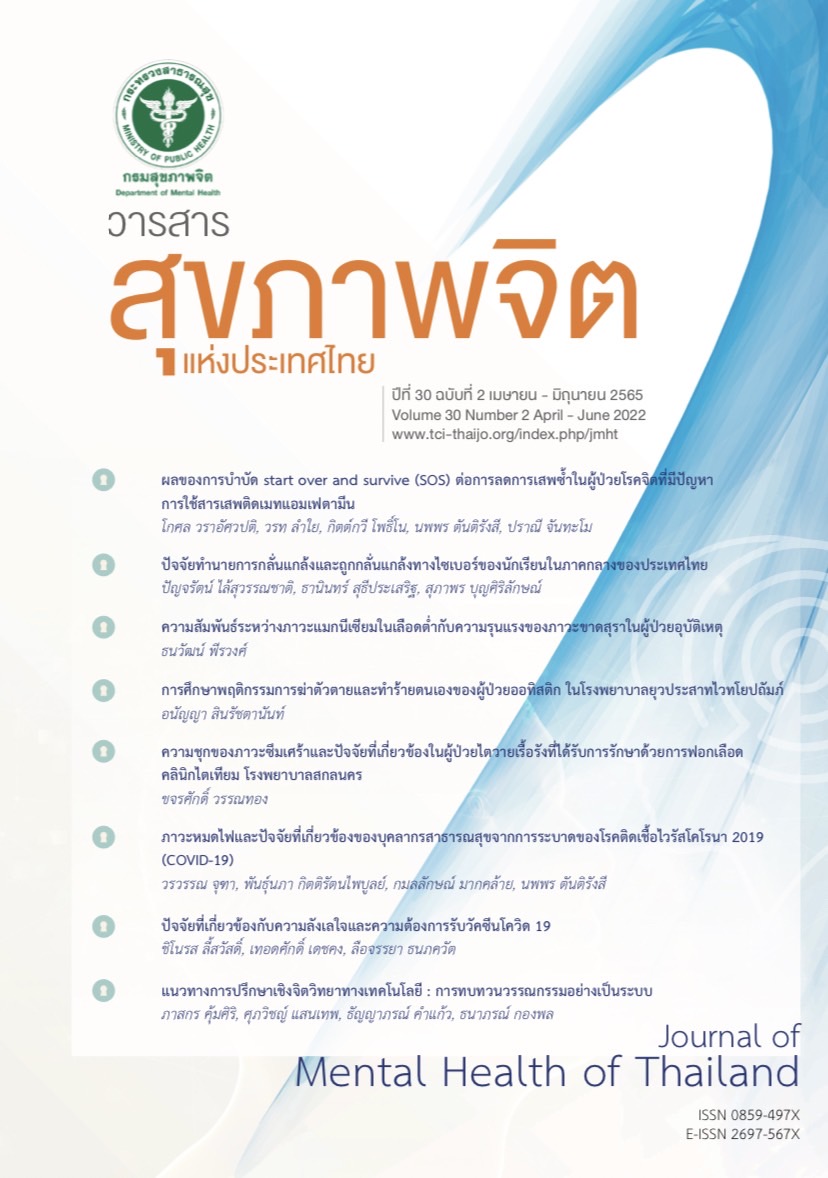ความสัมพันธ์ระหว่างภาวะแมกนีเซียมในเลือดต่ำกับความรุนแรงของภาวะขาดสุราในผู้ป่วยอุบัติเหตุ
คำสำคัญ:
กลุ่มอาการระยะคิวทียาว, ภาวะขาดสุรารุนแรง, ภาวะแมกนีเซียมในเลือดต่ำ, อุบัติเหตุบทคัดย่อ
วัตถุประสงค์ : เพื่อหาความสัมพันธ์ระหว่างภาวะแมกนีเซียมในเลือดต่ำกับความรุนแรงของภาวะขาดสุราในผู้ป่วยอุบัติเหตุ
วิธีการ : เป็นการศึกษาเชิงสมุฏฐานแบบย้อนหลัง ใช้ข้อมูลทุติยภูมิระหว่างเดือนมิถุนายน 2563 ถึงพฤษภาคม 2564 แบ่งกลุ่มภาวะขาดสุรารุนแรงและภาวะขาดสุราไม่รุนแรงด้วยคะแนน alcohol withdrawal scale (AWS) ใช้สถิติเชิงพรรณนา สถิติเชิงอนุมาน และวิเคราะห์ถดถอยโลจิสติก เพื่อหาความสัมพันธ์ระหว่างภาวะแมกนีเซียมในเลือดต่ำและความรุนแรงของภาวะขาดสุรา กำหนดระดับนัยสำคัญทางสถิติที่ระดับ .05
ผล : กลุ่มตัวอย่าง 109 คน มีภาวะขาดสุรารุนแรง (severe alcohol withdrawal syndrome, sAWS) 89 คน (ร้อยละ 81.7) และภาวะขาดสุราไม่รุนแรง (non-severe alcohol withdrawal syndrome, nAWS) 20 คน (ร้อยละ 18.3) พบภาวะแมกนีเซียมในเลือดต่ำร้อยละ 50.6 ของกลุ่ม sAWS และร้อยละ 20.0 ของกลุ่ม nAWS เมื่อควบคุมด้วยปัจจัยรบกวนพบว่า ภาวะแมกนีเซียมในเลือดต่ำเพิ่มความเสี่ยงต่อ sAWS 7.48 เท่า (95% CI = 1.21 - 46.28, p = .03) ในกลุ่ม sAWS พบกลุ่มอาการระยะคิวทียาวร้อยละ 79.0 และ 45.7 เมื่อคำนวณด้วยสูตร Bazett และ Fridericia ตามลำดับ โดยไม่พบความสัมพันธ์ระหว่างกลุ่มอาการระยะคิวทียาวกับ sAWS
สรุป : ภาวะแมกนีเซียมในเลือดต่ำและกลุ่มอาการระยะคิวทียาวพบได้บ่อยในผู้ป่วยอุบัติเหตุที่มีภาวะขาดสุรา ภาวะแมกนีเซียมในเลือดต่ำเป็นปัจจัยทำนายภาวะขาดสุรารุนแรง
Downloads
เอกสารอ้างอิง
พันธุ์นภา กิตติรัตนไพบูลย์, นพพร ตันติรังสี, วรวรรณ จุฑา, อธิบ ตันอารีย์, ปทานนท์ ขวัญสนิท, สาวิตรี อัษณางค์กรชัย, และคณะ. รายงานการศึกษาเรื่อง ความชุกของโรคจิตเวชและปัญหาสุขภาพจิต: การสํารวจระบาดวิทยาสุขภาพจิตของคนไทยระดับชาติ ปี พ.ศ. 2556 [Prevalence of mental disorders and mental health problems: results from Thai national mental health survey 2013]. พิมพ์ครั้งที่ 1. นนทบุรี: สํานักบริหารระบบบริการสุขภาพจิต กรมสุขภาพจิต; 2559.
Sornpaisarn B, Sornpaisarn S, Shield K, Rehm J. Alcohol use and injury risk in Thailand: a case‐crossover emergency department study. Drug Alcohol Rev. 2020;39(5):539-45. doi:10.1111/dar.13094.
Schuckit MA. Recognition and management of withdrawal delirium (delirium tremens). N Engl J Med. 2014;371(22):2109-13. doi:10.1056/NEJMra1407298.
Turner RC, Lichstein PR, Peden JG, Busher JT, Waivers LE. Alcohol withdrawal syndromes: a review of pathophysiology, clinical presentation, and treatment. J Gen Intern Med. 1989;4(5):432-44. doi:10.1007/BF02599697.
สุวรรณา อรุณพงค์ไพศาล. ภาวะเมาสุราและภาวะขาดสุรา [Drunkenness and alcoholism]. ใน: สาวิตรี อัษณางค์กรชัย, บรรณาธิการ. ปัญหาและความผิดปกติจากการดื่มสุรา: ความสำคัญและการดูแลรักษาในประเทศไทย. พิมพ์ครั้งที่ 1. กรุงเทพฯ: สหมิตรพัฒนาการพิมพ์; 2557. น. 231-76.
Wetterling T, Kanitz RD, Besters B, Fischer D, Zerfass B, John U, et al. A new rating scale for the assessment of the alcohol-withdrawal syndrome (AWS scale). Alcohol Alcohol. 1997;32(6):753-60. doi:10.1093/oxfordjournals.alcalc.a008326.
การรักษาผู้ป่วยที่มีภาวะขาดสุรา [Treatment of patients with alcohol deficiency]. ใน: อังกูร ภัทรากร, ธญรช ทิพยวงษ์, อภิชาติ เรณูวัฒนานนท์, พัชรี รัตนแสง, วิมล ลักขณาภิชนชัช, บรรณาธิการ. แนวปฏิบัติการดูแลผู้ป่วยภาวะขาดสุราสำหรับทีมสหวิชาชีพ. พิมพ์ครั้งที่ 2. ปทุมธานี: สถาบันบำบัดรักษาและฟื้นฟูผู้ติดยาเสพติดแห่งชาติบรมราชชนนี กรมการแพทย์ กระทรวงสาธารณสุข; 2558. น. 10-18.
Carl G, Holzbach E. Reversible hypokalemia and hypomagnesemia during alcohol withdrawal syndrome. Nervenarzt. 1994;65(3):206-11.
Maguire D, Talwar D, Burns A, Catchpole A, Stefanowicz F, Robson G, et al. A prospective evaluation of thiamine and magnesium status in relation to clinicopathological characteristics and 1-year mortality in patients with alcohol withdrawal syndrome. J Transl Med. 2019;17(1):384. doi:10.1186/s12967-019-02141-w.
Ayirolimeethal A, Jacob T, George B, Kothamuttath P, Tharayil H. Serum magnesium level and severity of delirium in alcohol withdrawal state. Open J Psychiatry Allied Sci. 2019;10(2):120-3. doi:10.5958/2394-2061.2019.00026.0.
Elisaf M, Merkouropoulos M, Tsianos EV, Siamopoulos KC. Pathogenetic mechanisms of hypomagnesemia in alcoholic patients. J Trace Elem Med Biol. 1995;9(4):210-4. doi:10.1016/S0946-672X(11)80026-X.
มงคล ศิริเทพทวี, อัญชลี ศิริเทพทวี, ศิริภรณ์ ชัยศรี, บุษกร วรากรอมรเดช, เมษา สุพรรณรัง, สวัสดิ์ เที่ยงธรรม. ความไม่สมดุลของเกลือแร่แมกนีเซียมในผู้ป่วยที่มีภาวะถอนพิษสุรา [Serum magnesium abnormality in patients with alcohol withdrawal syndrome]. วารสารสถาบันจิตเวชศาสตร์สมเด็จเจ้าพระยา. 2558;9(2):36-48.
Li Z, Guo X, Liu Y, Sun G, Sun Y, Guan Y, et al. Relation of heavy alcohol consumption to QTc interval prolongation. Am J Cardiol. 2016;118(8):1201-6. doi:10.1016/j.amjcard.2016.07.033.
Trithiphen S, Vatesatogkit P, Vatesatogkit P, Ngarmukos T, Ngarmukos T, Chandanamattha P, et al. Prevalence of long QT interval in thailand and its association with all cause and cardiovascular mortality from a long-term cohort study. Eur Heart J. 2019;40(Supplement 1):4177. doi:10.1093/eurheartj/ehz746.1171.
Frankel H, Haskell R, Lee SY, Miller D, Rotondo M, Schwab CW. Hypomagnesemia in trauma patients. World J Surg. 1999;23(9):966-9. doi:10.1007/s002689900608.
Dabrowski W, Schlegel TT, Wosko J, Rola R, Rzecki Z, Malbrain ML, et al. Changes in spatial QRS-T angle and QTc interval in patients with traumatic brain injury with or without intra-abdominal hypertension. J Electrocardiol. 2018;51(3):499-507. doi:10.1016/j.jelectrocard.2017.12.038.
World Health Organization. The ICD-10 classification of mental and behavioural disorders: clinical descriptions and diagnostic guidelines. Geneva: World Health Organization; 1992.
Maneewong J, Maneeton B, Maneeton N, Vaniyapong T, Traisathit P, Sricharoen N, et al. Delirium after a traumatic brain injury: predictors and symptom patterns. Neuropsychiatr Dis Treat. 2017;13:459-65. doi:10.2147/NDT.S128138.
Yu AS, Chertow GM, Skowecki K, Luyckx VA, Taal MW, Marsden PA, et al. Brenner and Rector's the Kidney. 11 ed. Philadelphia: Elsevier Health Sciences; 2020.
Lambiase PD, de Bono JP, Schilling RJ, Lowe M, Turley A, Slade A, et al. British Heart Rhythm Society clinical practice guidelines on the management of patients developing QT prolongation on antipsychotic medication. Arrhythm Electrophysiol Rev. 2019;8(3):161-5. doi:10.15420/aer.2019.8.3.G1.
VanDerHeyden N, Cox TB. Trauma scoring. In: Asensio JA, Trunkey DD, editors. Current therapy of trauma and surgical critical care. Philadelphia: Mosby; 2008. p. 26-32.
Surawicz B, Knilans T. Chou's electrocardiography in clinical practice: adult and pediatric. 6th ed. Philadelphia: Elsevier Health Sciences; 2008.
Burns E, Buttner R. QT Interval [Internet]. Sydney: publisher unknown; 2021 [updated; 2021 sep 18; cited 2022 mar 21]. Available from: https://litfl.com/qt-interval-ecg-library/.
Teetharatkul T, Vittayanont A. Delirium tremens in psychiatric ward at Songklanagarind Hospital. J Health Sci Med Res JHSMR. 2018;36(3):205-14. doi:10.31584/jhsmr.2018.36.3.17.
ชนกานต์ นิยมทอง. ปัจจัยที่สัมพันธ์กับการเกิดความรุนแรงของภาวะถอนพิษสุรา [Associated factors in predicting alcohol withdrawal severity]. วารสารการแพทย์โรงพยาบาลศรีสะเกษ สุรินทร์ บุรีรัมย์. 2563;35(3):595-604.
Maldonado JR, Sher Y, Ashouri JF, Hills-Evans K, Swendsen H, Lolak S, et al. The "Prediction of Alcohol Withdrawal Severity Scale" (PAWSS): systematic literature review and pilot study of a new scale for the prediction of complicated alcohol withdrawal syndrome. Alcohol. 2014;48(4):375-90. doi:10.1016/j.alcohol.2014.01.004.
Sarai M, Tejani AM, Chan AHW, Kuo IF, Li J. Magnesium for alcohol withdrawal. Cochrane Database Syst Rev. 2013;(6):CD008358. doi:10.1002/14651858.CD008358.
Raheja H, Namana V, Chopra K, Sinha A, Gupta SS, Kamholz S, et al. Electrocardiogram changes with acute alcohol intoxication: a systematic review. Open Cardiovasc Med J. 2018;12:1-6. doi:10.2174/1874192401812010001.
Chu T, Azevedo K, Ernst AA, Sarangarm D, Weiss SJ. A Comparison of QTc intervals in alcohol withdrawal patients versus acute coronary syndrome patients. South Med J. 2017;110(7):475-9. doi:10.14423/SMJ.0000000000000674.
Knight E, Lappalainen L. Clinical Institute Withdrawal Assessment for Alcohol-Revised might be an unreliable tool in the management of alcohol withdrawal. Can Fam Physician. 2017;63(9):691-5.
ดาวน์โหลด
เผยแพร่แล้ว
รูปแบบการอ้างอิง
ฉบับ
ประเภทบทความ
สัญญาอนุญาต
ลิขสิทธิ์ (c) 2022 วารสารสุขภาพจิตแห่งประเทศไทย

อนุญาตภายใต้เงื่อนไข Creative Commons Attribution-NonCommercial-NoDerivatives 4.0 International License.
- ผู้อ่านสามารถนำข้อความ ข้อมูล จากวารสารไปใช้ไปใช้ประโยชน์ทางวิชาการได้ เช่น เพื่อการสอน เพื่อการอ้างอิง แต่การนำไปใช้เพื่อวัตถุประสงค์อื่น เช่น เพื่อการค้า จะต้องได้รับอนุญาตเป็นลายลักษณ์อักษรจากกรมสุขภาพจิตก่อน
- ความคิดเห็น ข้อมูล และบทสรุปต่าง ๆ ที่ลงตีพิมพ์ในวารสารสุขภาพจิตแห่งประเทศไทยเป็นของผู้เขียนบทความและมิได้แสดงว่ากองบรรณาธิการหรือกรมสุขภาพจิตเห็นพ้องด้วย




